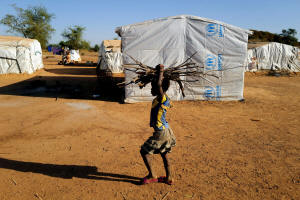|
The
U.N. humanitarian office (OCHA) estimates that some 18 million
people face severe food insecurity in the next three months
across the arid belt that stretching across Africa beneath the
Sahara. Its $3.8 billion appeal for the region is less than 12%
funded, OCHA spokesperson Jens Laerke said.
"The situation has reached alarming levels in Burkina Faso,
Chad, Mali and Niger, where people will experience emergency
levels of food insecurity during the lean season between June
and August," he told a media briefing, saying that the levels of
food insecurity were the worst since 2014.
In Burkina Faso, rations are currently at 75% in areas that are
hard-to-reach and the most food insecure, and 50% at other
sites, the World Food Programme said.
Rations have already been cut by half for displaced people and
refugees in Chad, it said. The WFP will be forced to reduce them
further from July if more funding is not received.
In Mauritania, the food component of the food-cash ration is
being cut by 50% at Mbera camp, it said.
The conflict between major grains producers Russia and Ukraine
is one factor that has driven up food prices in Africa. That
crisis has also diverted aid from other areas.
"Why is it as bad now? We have conflict in the West African
region, you have COVID still raging, you climate-induced shocks,
you have rising costs which are all colliding to put basic needs
out of reach for millions of people," Tomson Phiri from the WFP
told the briefing.
(Reporting by Emma Farge; Editing by Alison Williams)
[© 2022 Thomson Reuters. All rights
reserved.]
This material may not be published,
broadcast, rewritten or redistributed.
Thompson Reuters is solely responsible for this content.

|
|




